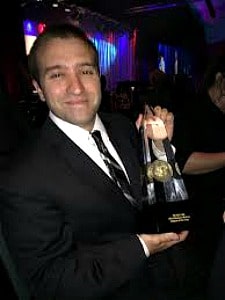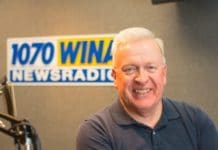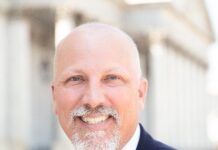
(By Ryan Wrecker) Bob Sievers would have turned 100 years old in August.
His first on-air moment was in 1936. Radio was still in its infancy, and the first generation of broadcasters were still learning how to best use a medium that was newly commercialized. I would argue that we’re now living with the first generation of digital broadcasters, and a century from now, radio will look back at this era as a turning point for our industry.
Bob is set to be inducted into the National Radio Hall of Fame this year for his impact on a community that called him a friend. To him, radio was about connection and service. He saw it as a responsibility. And that’s a lesson we can learn from today.
Many changes threatened the industry between the 1930s and 1980s, but the medium persisted. And today we’re facing another transformation, in the form of digital content and revenue.
“I remember the very first time I heard a guy make a mistake, and he started laughing. I thought that was so genuine, and for some reason it just flipped the switch,” says Guy Phillips about what made him fall in love with radio. The morning show host for Y98 in St. Louis was nominated for the Radio Hall of Fame this year, but lost in the public voting period to Bobby Bones.
A lot has changed for Guy, too. “I see not-good things for our industry because I think a lot of people have given up,” he says. “I believe that people in our business believe the business is doomed. I think there’s always going to be a place for live local radio, but I think our business has given up on the talent, and I think our business looks for the easy ways to make the money rather than to be great radio stations.”
That made me think about the talent who have persisted over the years, and the ones who will persist in the digital future.
How do your station — and your talent — approach social media? It seems most of us know we should be using the same playbook, valuing engagement and measurable results over strictly a bulk number of views. And I think it’s the right direction for radio to put stock into the connections that make listeners fall in love with personalities, but it’s easy to stumble when trying to translate it to the digital medium.
I wouldn’t use Twitter, Facebook, and Instagram as strictly a promotional arm of your digital strategy. If you’re smart, you’ll make sure talent consider them a device to connect with an audience and spread their influence. Industry greats with accomplished careers understand the responsibility and power that come with an on-air position. Personalities you’ll see in the Radio Hall of Fame used their medium not to settle for conventional or generic ways to entertain. They all aspired to reach new levels in the industry to make themselves stand out, and they worked hard at their craft until they achieved it.
Today, I don’t think enough personalities are truly trying to achieve greatness by means of their digital influence. We have all the tools to advance ourselves — yet we too often settle for the conventional when it comes to digital. “I think the millennial generation has far better ideas about media and public connection than the radio,” says Phillips.
Try this exercise at your radio station. Talk to veterans and ask them what their professional goals are and how they have changed over the years. Then talk to the interns and younger broadcasters and find out what their expectations are. I think you’ll find very quickly that the means of attaining the goals may have changed, but the drive and desire are the same. That energy just needs to be directed to make the most of all the tools available.
For Guy Phillips, part of his goal in his successful career has been to encourage younger generations in their careers. “Everyone should have a legacy,” he says. “The legacy, which is not ego-driven, is that you help others. That has always been my nature.” Just a few years ago he established a scholarship program for young broadcasters at his alma mater, New Mexico State University. It’s his way to bridge the gap in the broadcasting generations, as methods to reach a variety of audiences will adapt to the new landscape in radio in ways he never could have imagined back when he first started.
The legacy of radio is currently being reshaped. Sure, very few will have a Hall of Fame career like Bob Sievers. But over the course of his 51 years of service, he found ways to adapt and new ways to connect with the audience. Years in the future, the young broadcasters in school today will look back at us, the first generation of digital broadcasters. And the focus will be on those who worked hard to persevere — digitally.
Ryan hosts Overnight America on KMOX in St. Louis. Follow on Twitter @RyanWrecker or e-mail [email protected].





